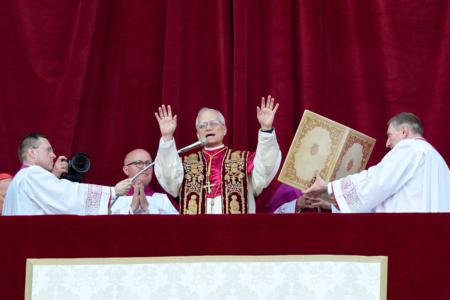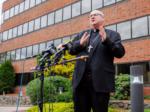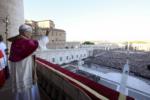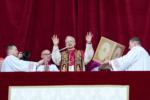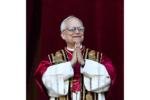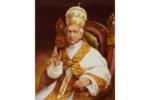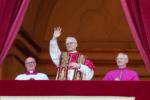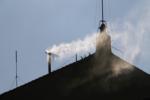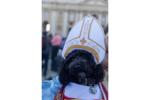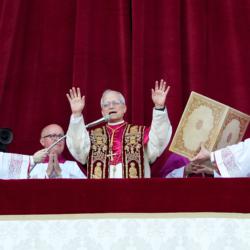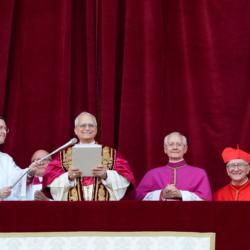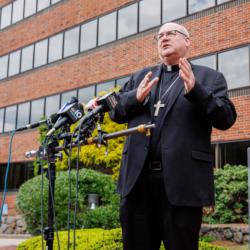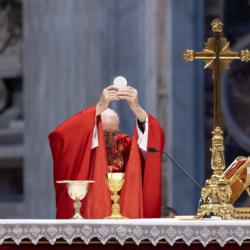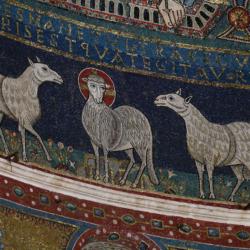Cardinal ordains seven permanent deacons
BOSTON -- While volunteering at MainSpring House and My Brother's Keeper, Deacon Michael Judge met many "giving men."
The giving men were themselves deacons, who volunteered with Deacon Judge, then a layman, at the two nonprofits. My Brother's Keeper is a charity based in Easton and Dartmouth that provides food and furniture to those in need. At MainSpring House, a homeless shelter in Brockton, Deacon Judge was responsible for "checking in" residents and listening to their stories. He would eventually start a prayer group for them.
"I learned that everybody has a different story, a different background," Deacon Judge, 59, told The Pilot. "Everybody has a different set of circumstances. And the one thing in common we all have, no matter what our background is, is Christ."
Some of the people he talked to had just lost their job while others were struggling with drug addiction or mental illness.
"It gave me a sense that there was more that I wanted, more that I needed, more that I was being called to do," he said.
That sense of purpose brought Deacon Judge to the diaconate.
Deacon Judge, a parishioner of St. Mary of the Angels in Hanover, was one of seven men ordained to the permanent diaconate of the Archdiocese of Boston in a Mass celebrated by Cardinal Seán P. O'Malley at the Cathedral of the Holy Cross on Sept. 21.
The other men ordained were: Paul Gerard Costello, 63, of Resurrection and St. Paul Parishes in Hingham; Thomas Francis Heyne, 40, of St. Mary of the Assumption Parish in Brookline; Kris Josef Larson, 60, of Our Lady Star of the Sea Parish in Marblehead; Anthony Ferdinand O'Brien, 64, of St. Theresa Parish in North Reading; Nelson Medeiros Pimentel, 63, of Immaculate Conception and St. James Parishes in Stoughton; and Richard Gerard Rabb, 61, of Blessed Sacrament and St. Mary Parishes in Walpole.
One member of the ordination class, Richard Johnston died in 2023 at the age of 63 while still in formation.
"One of our brothers received another vocation," Cardinal O'Malley said of Johnston in his homily. "He was called home to eternity."
Deacon Judge told The Pilot that Johnston "was very giving of himself."
"He had a spirit of giving, a spirit of 'What's better for somebody else than for me?'" he said. "Which is something we can all learn from."
Johnston and his wife Cheryl were members of the Archdiocese of Boston Deaf Catholic community. Cheryl assisted with sign language interpretation during the Mass of Ordination.
"Rick was an inspiration, I think, to all of us," Deacon Heyne told The Pilot. "He and Cheryl were both inspirations to us."
Deacon Heyne recalled that during Zoom formation classes, he would sometimes get distracted. Whenever he looked at Rick and Cheryl, he would see how invested they were, always asking questions and wanting to know more.
"He had to climb a mountain to do what he did, and I certainly feel that he's now serving the church in another way, in Heaven," Deacon Heyne said. "Rick was a remarkable man."
In his homily, Cardinal O'Malley called the deacons "the Magnificent Seven" and pointed out that the ordination was being held on the feast of St. Matthew. The cardinal described how Christ served, called, and showed mercy to all people, even St. Matthew, who had the despised occupation of tax collector. Like Christ, the cardinal said, deacons must serve those who are rejected and marginalized by the rest of society.
"A call to ministry is always a call to conversion, to that ongoing struggle to narrow the gap between what we profess as Christ's followers and how we live that Gospel," he said.
Cardinal O'Malley referred to the scene in the Acts of the Apostles where seven men are first chosen as deacons amid ethnic divisions between Greek and Hebrew speakers. The cardinal compared the biblical story to an incident when he was a priest in Washington, D.C. At a public school near the Centro Catolico, where the cardinal worked, a massive food fight had broken out between Black and Hispanic students. The cardinal was asked to enter the school and dissolve the tensions. Many of the Hispanic students were his own parishioners, while many of the Black students had never seen a Capuchin friar before.
"The first mission of the deacon was to heal divisions, to build bridges, to promote reconciliation and unity," he said. "Unless you live on another planet, you know that the need for this is greater today than it ever has been, inside and outside the church."
He said that the poor, "even the hated tax collector," are "the protagonists of Jesus's Gospel."
"The deacon must be the merciful face of the church, reaching out to those in need, following Jesus's invitation to follow him," he said.
Cardinal O'Malley compared Christ's works of mercy to the responsibility of the diaconate. Like Christ, they come not to be served but to serve, and like Christ's sacrifice on the cross, there are sacrifices inherent to being a servant.
"Your ministry as a deacon will at times create pain and suffering," he said, "but the power of the cross can make your ministry all the more fruitful."
The wives and children of deacons, the cardinal said, must also participate in the deacons' ministry. He urged the new class of deacons to model virtuous family life to their communities and live a life of constant, sincere prayer to strengthen their vocation.
"Ordination is not the end of the road," he said. "It's a launching point for the future."
Prior to the cardinal's homily, the candidates for the diaconate were presented to him, and he elected them for ordination. The assembly applauded to show their approval of the election. After the homily, the candidates pledged to Cardinal O'Malley their obedience to their diocesan bishop. Then, the candidates lay prostrate before the altar in a sign of complete submission to God as the assembly prayed the Litany of the Saints for them.
"It was an amazing feeling to be before the cardinal and before the congregation," Deacon Judge told The Pilot after Mass.
Deacon Raab told The Pilot that he was used to lying prostrate, as he had often done so before the Eucharist during adoration.
"Just offering myself up to the Lord," he said.
Continuing the lineage dating back to the time of the Apostles, Cardinal O'Malley laid his hands upon the head of each candidate and prayed the Prayer of Ordination, officially ordaining them as deacons. The cardinal gave each of the deacons a copy of the Book of the Gospels, representing the expectation that they believe, preach, and practice the words within. The newly-ordained deacons then received the Kiss of Peace from their fellow deacons in attendance.
"It feels right," Deacon Judge told The Pilot after his ordination. "It feels like I'm exactly where I'm supposed to be."
Deacon Heyne, who prefers to be called Deacon Tommy, was the youngest man ordained.
"I think that this may represent a new and ongoing movement of millennials who are responding to Christ's call, both raising a family and serving," he said.
He has two small children with his wife Nancy, and a third is on the way. Both he and Nancy are physicians and work in a hospital. Deacon Heyne said that he and his wife were able to balance work, family, and studying for the diaconate "through the grace of God and the support of some others."
"There were many sacrifices, and it was challenging at times with the scheduling," he said.
He originally was discerning a vocation to the priesthood, but felt that God was calling him to the diaconate instead.
"We're all here to get as many people to Heaven as possible," he said.
Deacon Raab first felt called to the diaconate through 2016 and 2017, after a lifetime of serving the church. The call became stronger the more time he spent in adoration. As he studied for the diaconate, he had to sacrifice time spent with family in his native Wisconsin but got through it with the help of his wife Janette.
"I think this was just the next evolution of where Christ wants me to be," he said.
In his ministry, Deacon Raab wants to "be there for people on their journey."
"Not trying to solve their problem," he said. "But being there to accompany them on their journey. And then, if I can in any way just increase, the people who I minister to, their faith by exposing them more to Jesus Christ."
